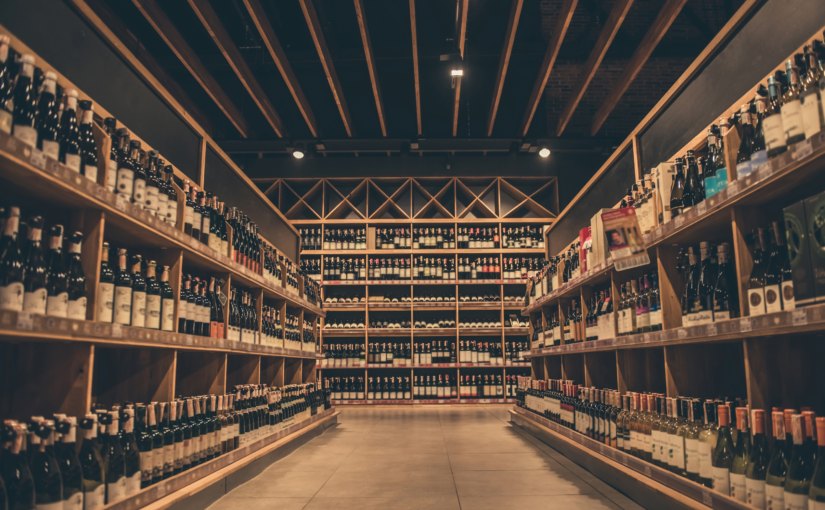For countless entrepreneurs, the dream of owning a liquor store is not merely about entering the retail world; it’s an attractive prospect filled with intrigue, history, and the promise of consistent demand. Such an establishment offers more than just bottles on shelves; it presents a canvas for savvy business minds to paint their success story.
Yet, like any masterpiece, this endeavor requires precise strokes and the right tools. At Armen Nazarian Business Brokers, we understand the intricacies of business acquisition, and we’re here to be your trusted partner in achieving your liquor store ownership dreams. Our role isn’t just about connecting buyers and sellers; we specialize in navigating the complex waters of acquisition, ensuring a seamless transition and a profitable investment.
As we journey through this comprehensive blog post, we’ll meticulously unravel every element of buying a liquor store in Michigan. From understanding market dynamics to delving into the nitty-gritty of licensing, this guide promises a holistic overview of stepping confidently into the liquor retail space. At Armen Nazarian Business Brokers, we have the expertise and experience to support you every step of the way. Let’s embark on this journey together toward your success. Connect with us online to discuss your aspirations and how we can help you realize them.
👉Also read: Key Questions to Ask When Buying a Business
Understanding the Liquor Store Business

When one thinks about entering the world of business, the liquor store industry stands out as a unique domain, often resilient to economic downturns and boasting a robust customer base. But what makes it tick? And why should you consider stepping into this sector?
The liquor store industry is not just about selling alcohol; it’s about understanding market trends, demographics, and seasons. Profit margins in this sector can be favorable, especially when the business owner is adept at purchasing and managing inventory. While many industries see profit margins fluctuate heavily with the economic climate, liquor stores often maintain steadier margins. On special occasions, holidays, weekends, or just a casual night in, the demand for alcoholic beverages remains consistent, making the potential for success notable.
Owning a liquor store offers benefits distinct from other businesses. For one, it’s a predominantly cash business, which can help maintain consistent cash flow. The products have a long shelf life compared to perishable items in other retail businesses, reducing inventory wastage. Moreover, with a well-established store in the right location, there’s an opportunity for stable, repeat business from a loyal clientele.
But success in the liquor business isn’t just handed to you. It requires a keen analysis of the market. Who are your potential buyers? Are you catering to a high-end market, or is your new liquor store more suited to everyday sales? Understanding your customer base, their preferences, and purchasing habits are pivotal. Moreover, being aware of local competition and their offerings can give your store the edge it needs.
The Role of Business Brokers in Liquor Store Acquisitions
Business brokers play an indispensable role when it comes to liquor store acquisitions. With their extensive industry expertise, these professionals bring tremendous value to the buying process, navigating complex transactions and ensuring prospective buyers make informed decisions. They are adept at understanding market dynamics, which aids in matching buyers with liquor store listings that best align with their investment goals and vision.
Moreover, a business broker doesn’t just connect a buyer to a seller. They provide crucial guidance in shaping a robust business plan, ensuring the buyer’s vision for the store is feasible and profitable. Such a plan is foundational, assisting in acquiring financing and ensuring long-term viability.
Additionally, brokers emphasize the importance of due diligence. They assist buyers in thoroughly vetting potential acquisitions, analyzing financial records, evaluating inventory, and identifying any potential risks. In essence, partnering with a business broker ensures a streamlined and educated approach to liquor store acquisitions.
Navigating the Liquor License and Regulatory Requirements
Diving into the liquor store business requires not only a passion for the industry but also a comprehensive understanding of the licensing requirements and state-specific laws. Every state has its regulations governing the sale of alcoholic beverages, and these can often be intricate and varied. It’s crucial for potential owners to be aware of these rules to ensure they operate within legal bounds.
Obtaining a liquor license is a pivotal step in this journey. The process entails submitting an application, undergoing background checks, and sometimes even attending hearings. Given the complexities involved, having a knowledgeable ally can be invaluable. This is where a licensed business broker comes into play. With their expertise and experience, they can guide a potential liquor store owner through the maze of paperwork, ensuring all documentation is accurate and submitted in a timely manner. Their involvement can significantly expedite and smoothen the licensing process.
Evaluating Liquor Store Listings and Performing Due Diligence
The journey towards buying a liquor store is filled with a multitude of decisions, each playing a critical role in the eventual success or failure of your investment. One of the most pivotal steps in this journey is the evaluation of liquor store business listings and, more importantly, performing thorough due diligence.
Liquor store listings are more than just advertisements; they are a window into potential investments. Every listing comes with its own unique set of attributes, challenges, and associated costs. For instance, the location of the store, the size of its inventory, its existing customer base, and its reputation in the community all factor into the price.
Beyond the asking price, there are costs associated with transferring licenses, potential renovations or updates, and any outstanding debts or liabilities the business might have. Overlooking any of these elements can lead to unexpected financial burdens down the line.
Due diligence is, in many ways, a safety net for potential buyers. It’s an in-depth examination that provides a clear picture of what you’re stepping into. When conducting due diligence, some key areas to focus on include:
Financial Statements
Reviewing the store’s profit and loss statements, balance sheets, and tax returns for at least the past three years gives a clear view of its financial health.
Inventory
Understand the value of the current stock. Is it outdated, or is it popular and fast-moving?
Liabilities
Uncover any hidden debts, unpaid loans, or potential legal issues that could be inherited from the business.
Reputation
Research customer reviews and feedback. A store’s reputation can significantly impact its future profitability.
Licensing
Ensure all licenses, especially the liquor license, are valid and transferrable.
With a keen eye for detail and a wealth of experience, brokers can identify inconsistencies in financial reports, advise on the real value of the inventory, and even assist in negotiations based on their findings. Their expertise ensures that you, as the buyer, have a comprehensive understanding of the store’s worth and potential, allowing you to make an informed and confident decision.
Negotiating the Sale and Closing the Deal
Embarking on the journey of acquiring a liquor store inevitably leads to the negotiation table. It’s essential to adopt effective strategies when discussing sales prices and terms. Being well-prepared with market research, having a clear budget, and understanding the value of the store’s assets can position a buyer favorably during negotiations.
Business brokers play a pivotal role during these discussions, acting as intermediaries and leveraging their expertise to ensure both parties reach a mutually beneficial agreement. Their in-depth knowledge of the industry and the art of negotiation can smooth potential friction points, making the transaction seamless.
Once terms are agreed upon, the final phase is closing the deal. This entails finalizing all documentation, ensuring compliance with legal requirements, and formally transferring ownership. With the right guidance, buyers can transition smoothly into their new role as liquor store owners.
Marketing and Growing Your Liquor Store Business
Entering the liquor store industry necessitates a robust marketing strategy. To stand out in a saturated market, proprietors should explore a mix of traditional and digital marketing techniques, such as hosting tasting events, leveraging social media, or offering promotions. These tactics not only attract new customers but also enhance sales.
A successful liquor store often has a loyal customer base. Owners can capitalize on this by introducing loyalty programs or exclusive member discounts. Referral programs can also incentivize existing customers to introduce friends and family, fueling growth.
Lastly, a liquor store’s location and its operational efficiency play paramount roles in its success. Being situated in high-footfall areas or near complementary businesses can drive liquor sales. Concurrently, streamlined operations, from inventory management to customer service, ensure that the business thrives and remains competitive in the market.
Financing Your Liquor Store Acquisition
Purchasing a liquor store is a significant investment, requiring potential buyers to meticulously evaluate all associated costs, from the store’s selling price to inventory and operational costs. This detailed financial assessment lays the groundwork for understanding the complete financial commitment involved.
There are several avenues available to aspiring liquor store owners when considering financing options. Traditional bank loans, Small Business Administration (SBA) loans, or even seller financing might be feasible options. Additionally, there are often financial assistance programs or incentives available for entrepreneurs, which can alleviate some financial burdens.
Business brokers play an invaluable role in this aspect of the acquisition. With their expansive network and industry knowledge, they can introduce buyers to credible lenders or financial institutions tailored to the liquor store industry, thus simplifying the process of securing necessary funds.
👉Also read: 7 Signs You Are Ready To Sell Your Business: Armen Nazarian Business Brokers
Your Journey to Liquor Store Ownership Starts Here
The allure of owning a liquor store goes beyond being a retailer; it’s about crafting a success story within a dynamic industry. From understanding market trends to navigating intricate licensing processes, the path to becoming a proud liquor store owner in Michigan is both exciting and rewarding.
At Armen Nazarian Business Brokers, we’re not just observers; we’re active partners in your quest for liquor store ownership. Our seasoned expertise, comprehensive guidance, and unparalleled industry insights empower you to make informed decisions at every turn. We understand the complexities of business acquisition, and we’re here to ensure your journey is not only seamless but also prosperous.
As you journey through this comprehensive guide, we hope you’ve gained valuable insights into the intricacies of buying a liquor store. Now, it’s time to take the next step. Reach out to us today at 248-231-7714 or connect with us online to discuss your aspirations. Whether you’re seeking guidance, support, or expert advice, Armen Nazarian Business Brokers is here to be your dedicated partner. Let’s turn your dream of owning a liquor store into a thriving reality.
